[ad_1]
Are you on the lookout for the simplest technique to get all house owners of an ERC20 token? In that case, then you definately’re precisely the place it’s essential be! In immediately’s information, we’ll present you the best way to get sorted holders of a token in a heartbeat utilizing Moralis’ Token API. In case you instantly wish to bounce straight into the code, try our ERC20 House owners endpoint in motion down under:
import fetch from ‘node-fetch’;
const choices = {
methodology: ‘GET’,
headers: {
settle for: ‘utility/json’,
‘X-API-Key’: ‘YOUR_API_KEY’
},
};
fetch(
“https://deep-index.moralis.io/api/v2.2/erc20/0x7d1afa7b718fb893db30a3abc0cfc608aacfebb0/house owners?chain=eth&order=DESC”,
choices
)
.then((response) => response.json())
.then((response) => console.log(response))
.catch((err) => console.error(err));
In return for operating the code above, you’ll get an array comprising all house owners of the token in query in descending order – cryptocurrency whales first! What’s extra, the response is enriched with extra information, reminiscent of proprietor percentages, the USD worth of particular person holdings, and so forth. Right here’s an instance of what it’d appear to be:
{
“cursor”: “eyJhbGciOiJIUz//…”,
“web page”: 1,
“page_size”: 100,
“consequence”: [
{
“balance”: “3704449652939473320142469218”,
“balance_formatted”: “3704449652.939473320142469218”,
“is_contract”: false,
“owner_address”: “0x5e3ef299fddf15eaa0432e6e66473ace8c13d908”,
“owner_address_label”: “Polygon (Matic): PoS Staking Contract”,
“usd_value”: “3489442144.205111503601074219”,
“percentage_relative_to_total_supply”: 37.044496529394735
},
//…
]
}
Getting sorted holders of a token doesn’t need to be tougher than that. Nevertheless, if you would like a extra detailed breakdown, please try the documentation web page for our ERC20 House owners endpoint or be part of us on this information.
Additionally, should you want to get all house owners of an ERC20 token your self, don’t overlook to enroll with Moralis. You possibly can create an account totally free, and also you’ll acquire immediate entry to our premier suite of improvement instruments!
Overview
Figuring out the house owners of an ERC20 token has been fairly a bothersome activity from a standard perspective. Usually, this course of requires manually monitoring possession modifications and transactions throughout various protocols, making a workflow that’s each time-intensive and complicated. Certainly, there should be a extra environment friendly methodology, proper?

At Moralis, we got down to rework this historically troublesome course of right into a easy activity you may full with out breaking a sweat. And that is exactly what our ERC20 House owners endpoint permits you to do. So, should you’d wish to discover the simplest technique to get sorted holders of a token, then this learn is for you. Let’s bounce straight into it by introducing Moralis!
What’s Moralis? – The Best Option to Get All House owners of an ERC20 Token
Moralis is the {industry}’s main Web3 information supplier, supplying the sources it’s essential construct subtle dapps. In our suite of improvement instruments, you’ll discover all the things from top-tier blockchain nodes to 10+ use case-specific APIs. What’s extra, Moralis presently powers blockchain and crypto tasks for tens of millions of finish customers all throughout the globe!

So, why do you have to use Moralis when constructing dapps?
One API – All of the Knowledge: All our APIs are designed to reduce the requests it’s essential construct dapps. This implies you get extra information with fewer API calls when working with Moralis, resulting in decrease prices and enhanced effectivity. Streamline Your Growth Expertise: Moralis’ APIs are intuitive and absolutely cross-chain. As such, you don’t need to hassle with a number of suppliers for numerous chains when utilizing our APIs, supplying you with a considerably extra accessible improvement expertise. Trusted By Business Leaders: Moralis is utilized by 100,000+ builders and trusted by {industry} leaders like MetaMask, Blockchain.com, and Opera.

However, that provides you an outline of Moralis. Let’s now dive a bit deeper into our Web3 API suite and discover the Token API – the most effective instrument to get all house owners of an ERC20 token!
Moralis’ Token API and the ERC20 House owners Endpoint
Moralis’ Token API is the {industry}’s #1 instrument for ERC20 token information, supporting each single token throughout all main chains. This contains stablecoins, meme cash, LP tokens, and all the things in between. So, should you’re seeking to combine ERC20s into your dapps, then the Token API is the instrument for you!
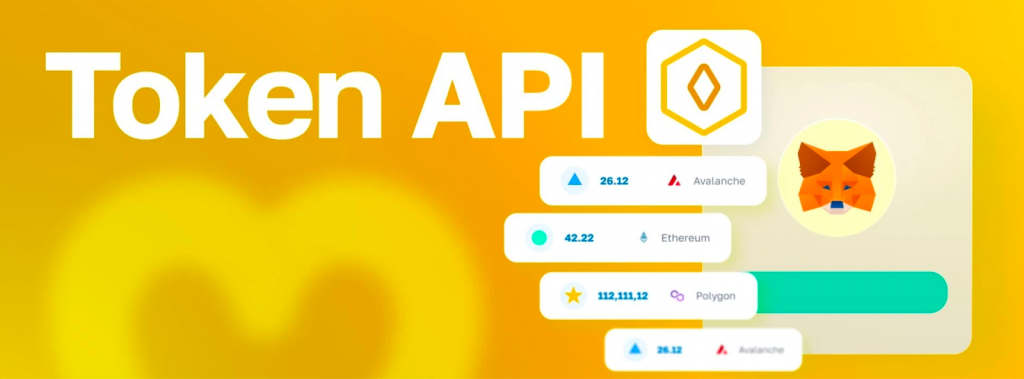
With the Token API, you may seamlessly combine balances, costs, transfers, and way more into your dapps with out breaking a sweat. What’s extra, with our ERC20 House owners endpoint, you may get sorted holders of a token with a single line of code.
The ERC20 House owners endpoint simplifies the method of fetching correct ERC20 proprietor information right into a easy operation you may full in a heartbeat. With this modern function, now you can fetch the highest holders and complete provide of any token, together with possession percentages, the USD worth of particular person holdings, and extra, with ease.
So, how does it work?
Nicely, to reply the above query, let’s dive into a brief script calling our ERC20 House owners endpoint:
import fetch from ‘node-fetch’;
const choices = {
methodology: ‘GET’,
headers: {
settle for: ‘utility/json’,
‘X-API-Key’: ‘YOUR_API_KEY’
},
};
fetch(
“https://deep-index.moralis.io/api/v2.2/erc20/0x7d1afa7b718fb893db30a3abc0cfc608aacfebb0/house owners?chain=eth&order=DESC”,
choices
)
.then((response) => response.json())
.then((response) => console.log(response))
.catch((err) => console.error(err));
All it’s a must to do is change YOUR_API_KEY together with your Moralis API key, configure the parameters to suit your question and run the script. In return, you’ll get a response comprising an array of homeowners, together with their complete stability, the worth of their holdings, and way more. Right here’s an instance of what the response can appear to be:
{
“cursor”: “eyJhbGciOiJIUz//…”,
“web page”: 1,
“page_size”: 100,
“consequence”: [
{
“balance”: “3704449652939473320142469218”,
“balance_formatted”: “3704449652.939473320142469218”,
“is_contract”: false,
“owner_address”: “0x5e3ef299fddf15eaa0432e6e66473ace8c13d908”,
“owner_address_label”: “Polygon (Matic): PoS Staking Contract”,
“usd_value”: “3489442144.205111503601074219”,
“percentage_relative_to_total_supply”: 37.044496529394735
},
//…
]
}
The Advantages of Moralis’ ERC20 House owners Endpoint
Now that you’ve familiarized your self with the ERC20 House owners endpoint, let’s dive a bit deeper into the advantages of this function:
Fewer API Calls: Up to now, you wanted to manually observe possession throughout the blockchain, which was a time-consuming and resource-intensive course of. By consolidating ERC20 proprietor information right into a ready-to-use endpoint, you now want far fewer API calls to get the information you want. Token Holder Perception: With the ERC20 House owners endpoint, you may seamlessly fetch the highest holders of any token, considerably boosting transparency and the understanding of token distribution. Simplified Token Analytics: With the ERC20 House owners endpoint, now you can effortlessly full complicated analytics duties. This contains figuring out distinctive holders, possession percentages, early adopters, newcomers, and so forth.

3-Step Tutorial: Methods to Get All House owners of an ERC20 Token with Moralis
We’ll now stroll you thru a easy tutorial on the best way to get sorted holders of a token utilizing Moralis’ Token API. And due to the accessibility of this industry-leading instrument, you’ll have the ability to get the information you want in three simple steps:
Get a Moralis API KeyWrite a Script Calling the ERC20 House owners EndpointRun the Code
Nevertheless, earlier than we will get going, it’s essential to cope with some stipulations!
Conditions
This will likely be a JavaScript and Node.js tutorial. As such, should you haven’t already, be sure to arrange the next earlier than persevering with:
Step 1: Get a Moralis API Key
To get a Moralis API key, it’s essential create an account by clicking on the ”Begin for Free” button on the high proper on the Moralis homepage:
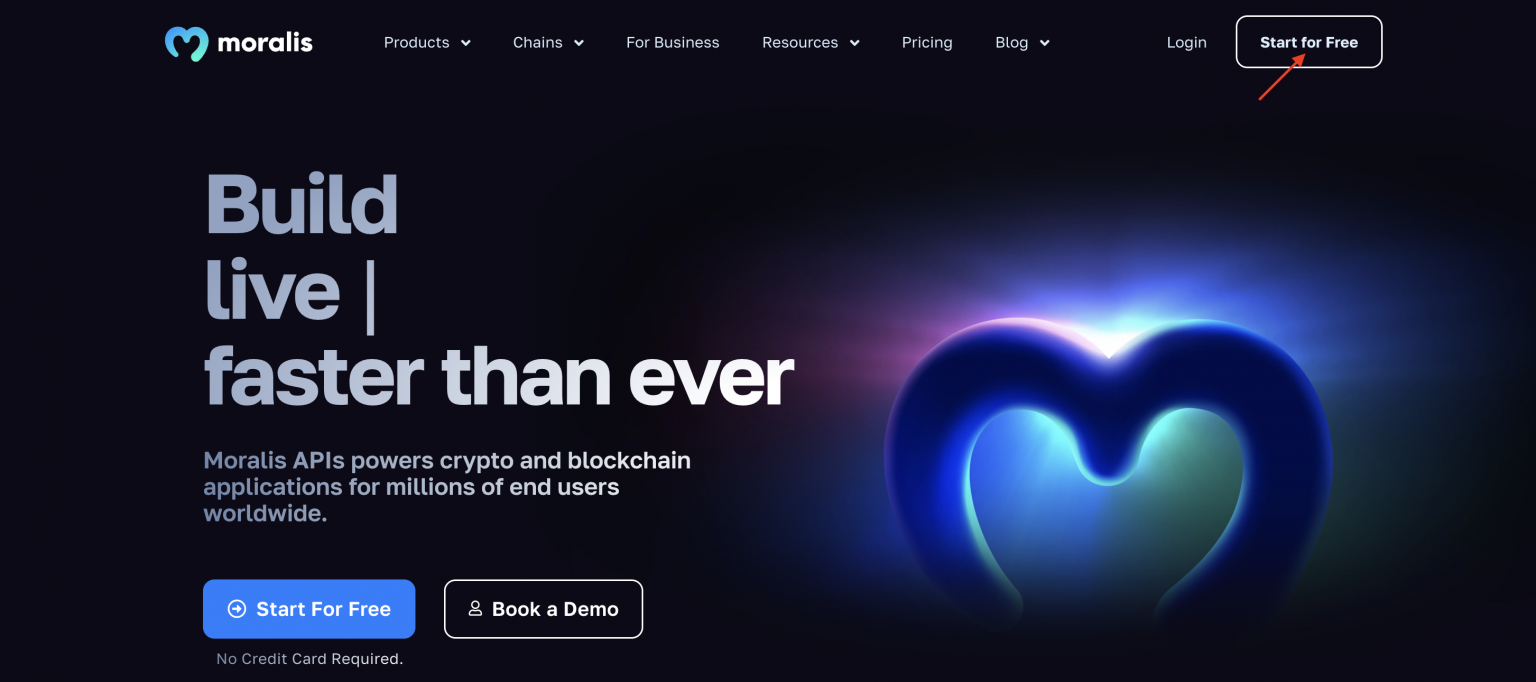
When you’re finished organising your account, it’s essential log in, navigate to the ”Settings” tab, scroll down, and replica your key:
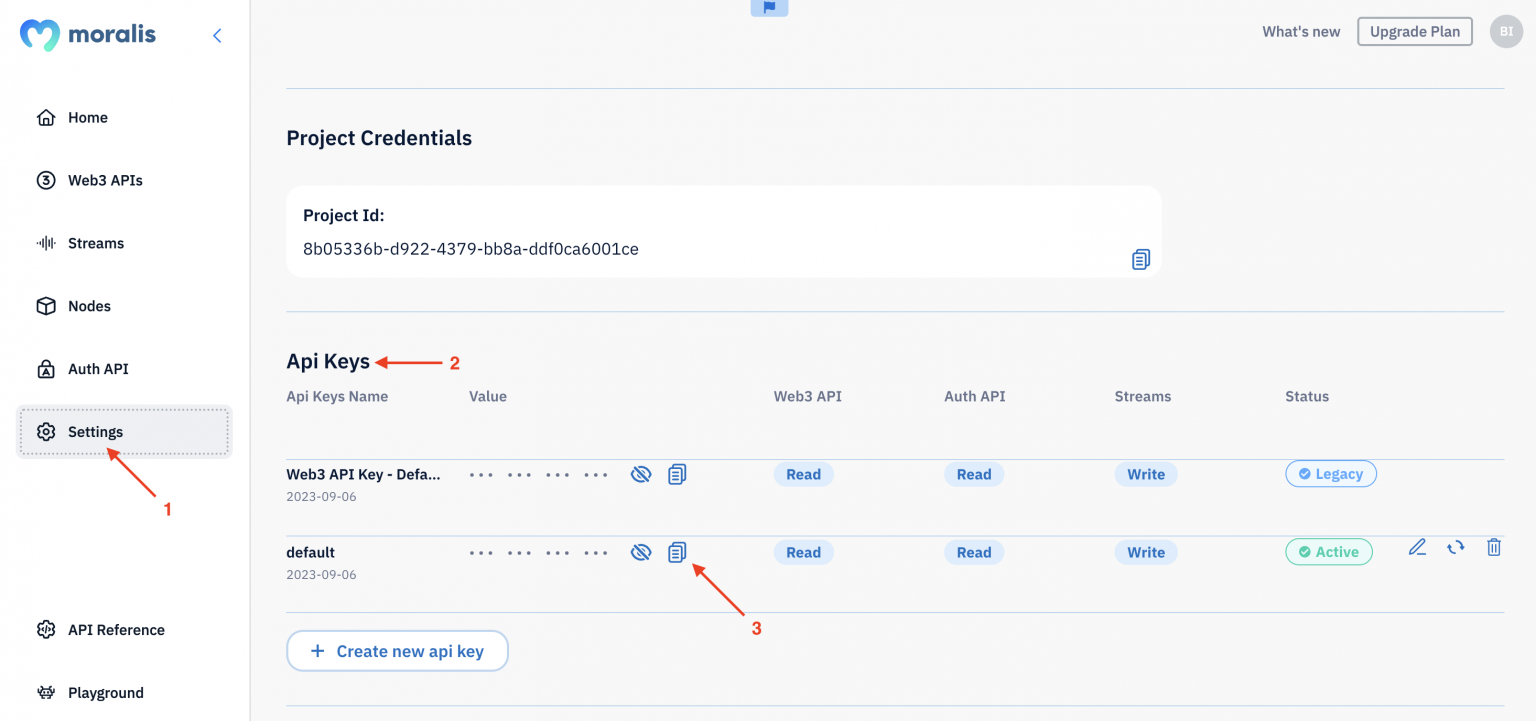
Hold the important thing for now. You’re going to want it within the following step to initialize Moralis.
Step 2: Write a Script Calling the ERC20 House owners Endpoint
Begin by opening your most well-liked IDE and arrange a folder. Subsequent, open a brand new terminal and initialize a mission with the command under:
npm init
You then want to put in the required dependencies with the next terminal inputs:
npm set up node-fetch –save
npm set up moralis @moralisweb3/common-evm-utils
Subsequent, open your ”bundle.json” file and add ”sort”: ”module” to the listing:
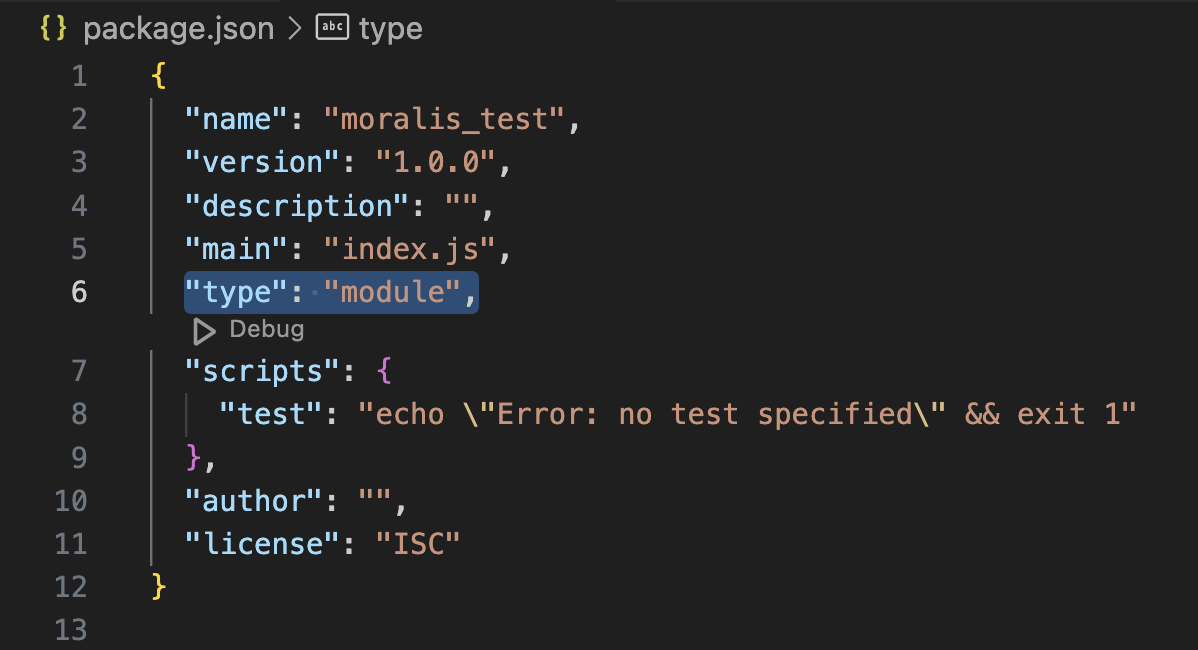
You possibly can then create a brand new ”index.js” file and add the next contents:
import fetch from ‘node-fetch’;
const choices = {
methodology: ‘GET’,
headers: {
settle for: ‘utility/json’,
‘X-API-Key’: ‘YOUR_API_KEY’
},
};
fetch(
“https://deep-index.moralis.io/api/v2.2/erc20/0x7d1afa7b718fb893db30a3abc0cfc608aacfebb0/house owners?chain=eth&order=DESC”,
choices
)
.then((response) => response.json())
.then((response) => console.log(response))
.catch((err) => console.error(err));
From right here, it’s essential configure the code barely. First, change YOUR_API_KEY with the Moralis key you copied throughout step one. Subsequent, you additionally must configure question parameters to suit your question.
That’s it for the code. All that continues to be from right here is executing the script!
Step 3: Run the Code
You possibly can execute the code by opening a brand new terminal and operating the command under within the root folder of the mission:
node index.js
In return, you’ll get a response containing all house owners of the ERC20 token specified within the tackle parameter. Right here’s an instance of what it’d appear to be:
{
“cursor”: “eyJhbGciOiJIUz//…”,
“web page”: 1,
“page_size”: 100,
“consequence”: [
{
“balance”: “3704449652939473320142469218”,
“balance_formatted”: “3704449652.939473320142469218”,
“is_contract”: false,
“owner_address”: “0x5e3ef299fddf15eaa0432e6e66473ace8c13d908”,
“owner_address_label”: “Polygon (Matic): PoS Staking Contract”,
“usd_value”: “3489442144.205111503601074219”,
“percentage_relative_to_total_supply”: 37.044496529394735
},
//…
]
}
And that’s it; it doesn’t need to be tougher than that to get sorted holders of a token when working with Moralis!
Use Instances for Our API and the ERC20 House owners Endpoint
Our ERC20 House owners endpoint is indispensable for many builders constructing dapps associated to fungible tokens. Nevertheless, to provide you a number of examples, let’s discover three distinguished use circumstances for this function:
Token Analytics: Token analytics platforms are web sites or purposes that give customers worthwhile perception into the efficiency of the market and particular person tokens. An ideal instance of a mission leveraging our APIs is Moralis Cash – the {industry}’s main token analytics platform.
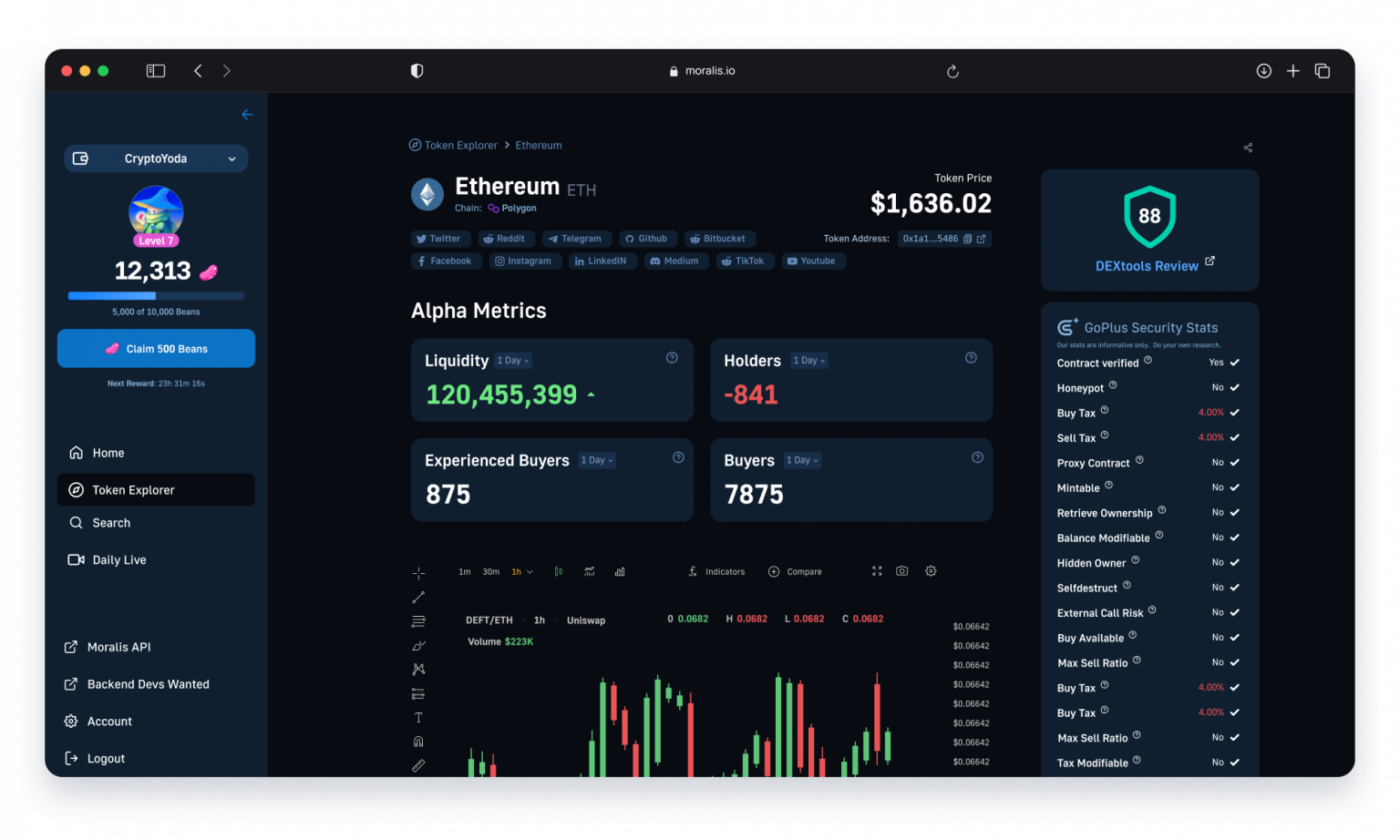
Portfolio Trackers: Portfolio trackers are platforms that give customers an entire overview of all their digital holdings. This usually contains each ERC20s and NFTs, in addition to shares and different digital belongings. Delta is a superb instance of a portfolio tracker platform leveraging our APIs to maintain customers up to date about latest on-chain occasions.
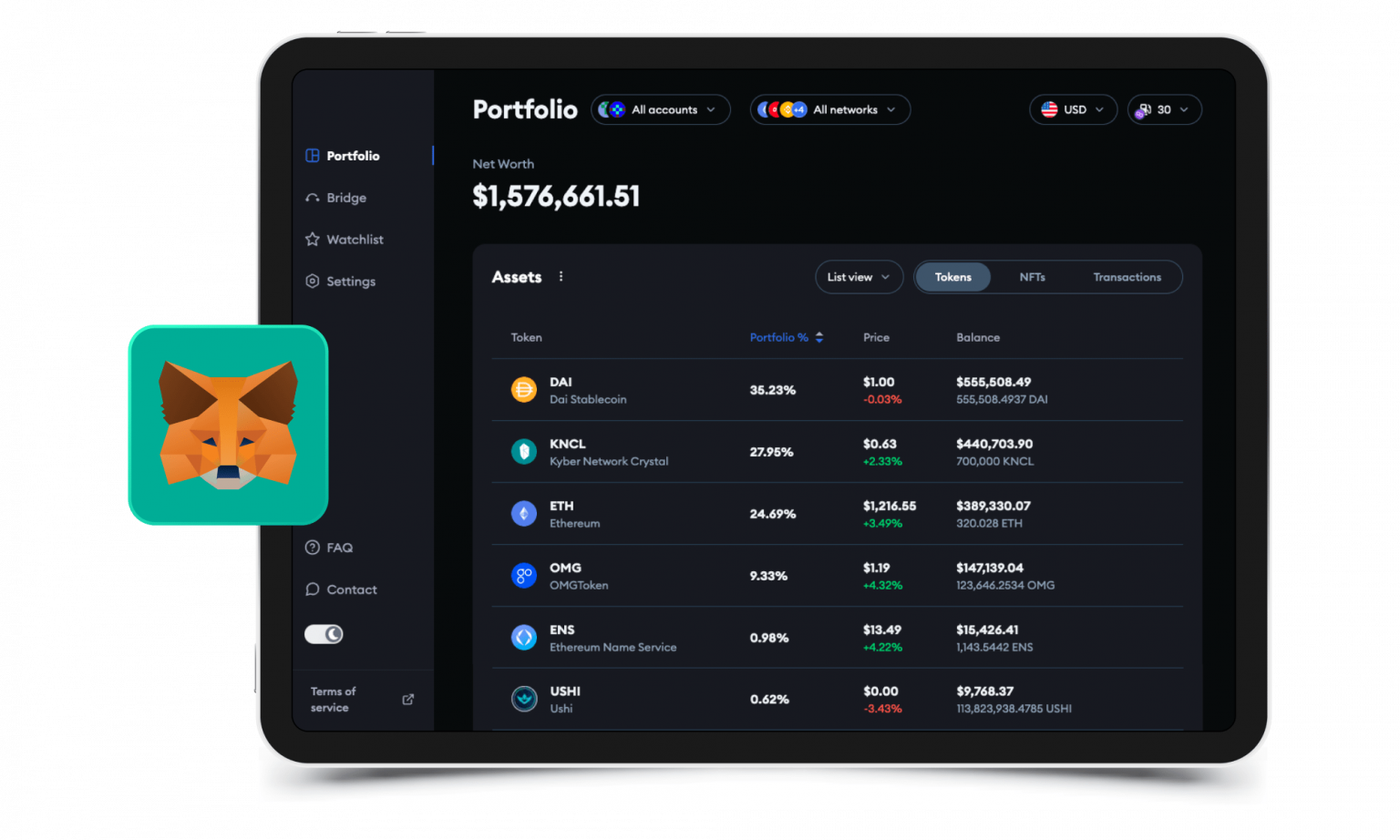
Cryptocurrency Wallets: Cryptocurrency wallets are web sites and purposes for storing digital belongings. The very best wallets additionally present options for getting, promoting, and buying and selling tokens. A distinguished instance of a supplier utilizing Moralis is MetaMask – the {industry}’s #1 cryptocurrency pockets.
Past the Token API – Exploring Moralis Additional
The Token API solely scratches the floor of what’s doable with Moralis. As such, let’s now discover some extra APIs you’ll probably discover useful when constructing your dapps. Nevertheless, we gained’t have the ability to cowl all of them on this information, which is why we’ll give attention to the next three interfaces:
Pockets APINFT APIBlockchain API
In case you’d wish to discover all our APIs, please go to the official Web3 API web page, which features a listing of all obtainable interfaces!
Pockets API
The Pockets API is the {industry}’s #1 API for pockets information, boasting a powerful array of options, unparalleled scalability, and distinctive flexibility. It’s the right instrument should you’re seeking to construct your individual crypto pockets or combine pockets functionalities into your dapp!
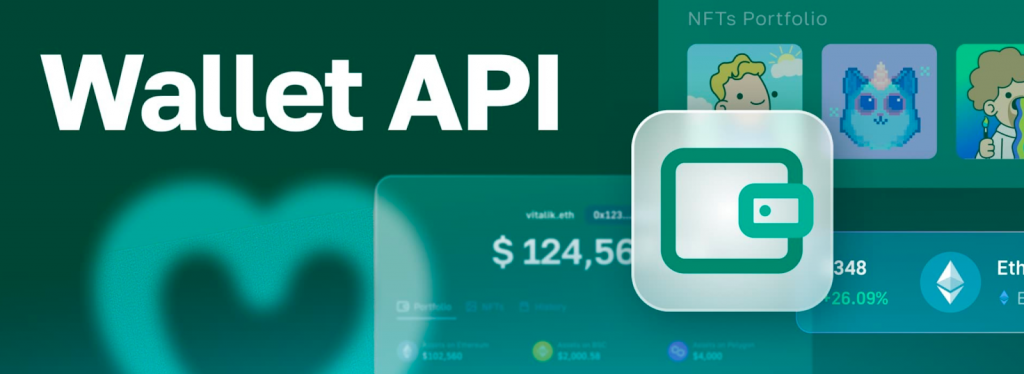
With the Pockets API, you may seamlessly fetch a pockets’s ERC20 balances, internet price, transaction historical past, and way more with a single line of code. To point out you the way it works, we’ll now take a look at an instance of how simple it’s to fetch the ERC20 balances – with costs and metadata – of a pockets utilizing our getWalletTokenBalancesPrice() endpoint:
import Moralis from ‘moralis’;
attempt {
await Moralis.begin({
apiKey: “YOUR_API_KEY”
});
const response = await Moralis.EvmApi.wallets.getWalletTokenBalancesPrice({
“chain”: “0x1”,
“tackle”: “0xcB1C1FdE09f811B294172696404e88E658659905”
});
console.log(response.uncooked());
} catch (e) {
console.error(e);
}
Calling the endpoint above returns an array of all tokens the pockets holds. What’s extra, the response is enriched with costs and metadata, permitting you to, as an example, construct a portfolio view with a single endpoint:
{
“cursor”: null,
“web page”: 0,
“page_size”: 100,
“consequence”: [
{
“token_address”: “0xae7ab96520de3a18e5e111b5eaab095312d7fe84”,
“symbol”: “stETH”,
“name”: “Liquid staked Ether 2.0”,
“logo”: “https://logo.moralis.io/0x1_0xae7ab96520de3a18e5e111b5eaab095312d7fe84_cd0f5053ccb543e08f65554bf642d751”,
“thumbnail”: “https://logo.moralis.io/0x1_0xae7ab96520de3a18e5e111b5eaab095312d7fe84_cd0f5053ccb543e08f65554bf642d751”,
“decimals”: 18,
“balance”: “90399378678107406”,
“possible_spam”: false,
“verified_contract”: true,
“total_supply”: “9542023372380838741270859”,
“total_supply_formatted”: “9542023.372380838741270859”,
“percentage_relative_to_total_supply”: 9.47381652195e-7,
“balance_formatted”: “0.090399378678107406”,
“usd_price”: 3611.562488280326,
“usd_price_24hr_percent_change”: 4.98306233529165,
“usd_price_24hr_usd_change”: 15.496644212196657,
“usd_value”: 326.483004997701,
“usd_value_24hr_usd_change”: 16.268851653168795,
“native_token”: false,
“portfolio_percentage”: 55.2363
},
//…
]
}
To discover different capabilities of this instrument, try our official Pockets API web page!
NFT API
Moralis’ NFT API is Web3’s premier interface for NFT information. This main instrument helps over three million NFT collections throughout all the largest chains, together with all the things from established tasks like Nakamigos to tokens that dropped simply seconds in the past!
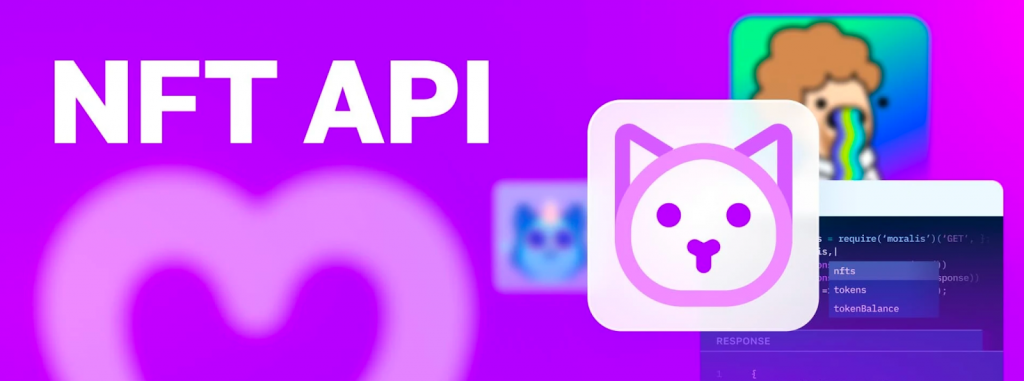
With the NFT API, you may seamlessly fetch metadata, balances, optimized picture previews, and way more with single endpoints. As such, you may construct all the things from marketplaces to Web3 video games with out breaking a sweat when utilizing the NFT API.
To spotlight the accessibility of the NFT API, we’ll now present you the best way to fetch the stability of any pockets with our getWalletNFTs() endpoint:
import Moralis from ‘moralis’;
attempt {
await Moralis.begin({
apiKey: “YOUR_API_KEY”
});
const response = await Moralis.EvmApi.nft.getWalletNFTs({
“chain”: “0x1”,
“tackle”: “0xff3879b8a363aed92a6eaba8f61f1a96a9ec3c1e”
});
console.log(response.uncooked);
} catch (e) {
console.error(e);
}
In return for calling the endpoint above, you’ll get an array of all NFTs held by the pockets in query. Right here’s an instance of what the response would possibly appear to be:
{
“standing”: “SYNCED”,
“web page”: 1,
“page_size”: 100,
“cursor”: “eyJhbGciOiJIUzI1Ni//…”,
“consequence”: [
{
“amount”: “1”,
“token_id”: “5021”,
“token_address”: “0xfff54e6fe44fd47c8814c4b1d62c924c54364ad3”,
“contract_type”: “ERC721”,
“owner_of”: “0xff3879b8a363aed92a6eaba8f61f1a96a9ec3c1e”,
“last_metadata_sync”: “2024-04-09T11:27:46.910Z”,
“last_token_uri_sync”: “2024-04-09T11:27:46.896Z”,
“metadata”: null,
“block_number”: “14647390”,
“block_number_minted”: “14647390”,
“name”: “Youtopia”,
“symbol”: “Youtopia”,
“token_hash”: “d4719eaf84eabcf443065b0a463f5886”,
“token_uri”: “http://api.youtopia-official.xyz/ipfs/5021”,
“minter_address”: “0x13f11fd2c7c7be94674651386370d02b7aac9653”,
“verified_collection”: false,
“possible_spam”: true,
“collection_logo”: “”,
“collection_banner_image”: “”
},
//…
]
}
Please try our NFT API web page to study extra about this interface!
Blockchain API
The Blockchain API helps you to unlock the ability of uncooked blockchain information with tempo and precision. It’s scalable, exact, and cross-chain, supplying you with what it’s essential construct all the things from block explorers to analytics instruments!

With the Blockchain API, you may seamlessly fetch block information, transactions, sensible contract logs, and extra with single traces of code. To point out you the way it works, let’s take a look at our getBlock() endpoint, permitting you to fetch the contents of any given block:
import Moralis from ‘moralis’;
attempt {
await Moralis.begin({
apiKey: “YOUR_API_KEY”
});
const response = await Moralis.EvmApi.block.getBlock({
“chain”: “0x1”,
“blockNumberOrHash”: “18541416”
});
console.log(response.uncooked);
} catch (e) {
console.error(e);
}
In return for calling the endpoint above, you’ll get the block’s hash, miner tackle, gasoline restrict, and extra. Right here’s an instance of what the response will appear to be:
{
“timestamp”: “2023-11-10T12:02:11.000Z”,
“quantity”: “18541416”,
“hash”: “0xe9de65582d5a210f3f5703e0d7dc1daf9fbb5a0670937f5d92283a41ea1bcb2b”,
“parent_hash”: “0xb63af7df0e2639cc25c323f22359b784408a117b534dea09cfec14263ea8d4fb”,
“nonce”: “0x0000000000000000”,
“sha3_uncles”: “0x1dcc4de8dec75d7aab85b567b6ccd41ad312451b948a7413f0a142fd40d49347”,
“logs_bloom”: “0x00200000410//…”,
“transactions_root”: “0x0b6895fbd7fdf9b8e0239e5be21a195c89ffae093c1c2bcdea9ad498d720003b”,
“state_root”: “0x787cc0fff225d2b6d8acef1cea33522293d134297c1f4b22819a90f157db183d”,
“receipts_root”: “0x6d7caa30f12937a232dcedda5f8bc2c973ba917a67062cedeb4ccb52c729058c”,
“miner”: “0x95222290DD7278Aa3Ddd389Cc1E1d165CC4BAfe5”,
“problem”: “0”,
“total_difficulty”: “58750003716598352816469”,
“dimension”: “7792”,
“extra_data”: “0x6265617665726275696c642e6f7267”,
“gas_limit”: “30000000”,
“gas_used”: “1372772”,
“transaction_count”: “11”,
“base_fee_per_gas”: “35229184857”,
“transactions”: [
//…
]
}
Try our Blockchain API web page to study extra about this premier interface!
Abstract: Methods to Get All House owners of an ERC20 Token
From a standard perspective, fetching the house owners of an ERC20 token has been an annoying activity. It usually requires manually monitoring possession and transactions throughout the blockchain, which is each tedious and time-consuming. Thankfully, it’s now doable to bypass this fully with Moralis’ ERC20 House owners endpoint!
With our ERC20 House owners endpoint, now you can get sorted holders of a token with a single API name. Along with the house owners, you additionally get possession percentages, the USD worth of particular person holdings, and way more throughout the similar response. And with this premier function, we’re decreasing the boundaries to complicated information analytics, making token possession information extra accessible to everybody!

In case you favored this tutorial on the best way to get all house owners of an ERC20 token, contemplate studying extra content material right here at Moralis. As an illustration, try our most up-to-date article on the most effective crypto emblem API or discover ways to get the web price of any ERC20 pockets.
Additionally, don’t overlook that you could enroll with Moralis freed from cost. So, take this chance to supercharge your Web3 tasks with streamlined information integration from Moralis!
[ad_2]
Source link



